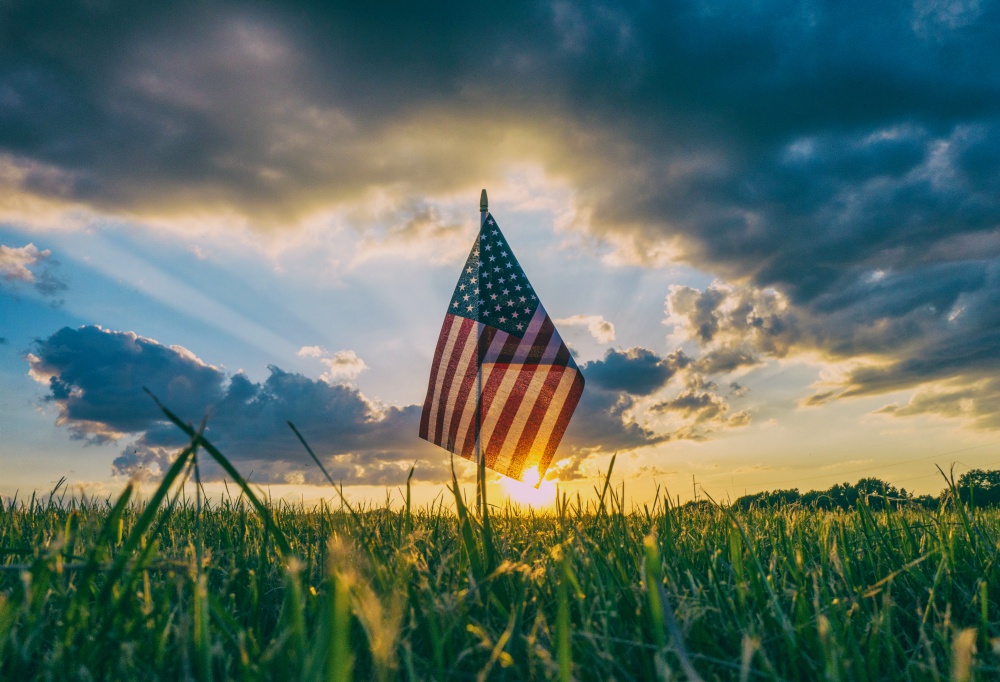
(Unsplash/Aaron Burden)
President Donald Trump says if his opponent, former Vice President Joe Biden, wins the Nov. 3 U.S. presidential election, the nation will descend into godless socialism where the streets are overrun with violent protesters. Biden says if Trump wins, the government will become an autocracy where citizens' rights are subject to the whims of the president and his supporters.
"Everybody's thinking of this election in apocalyptic terms, that it's a choice between life and death," said Sr. Marcia Hall, vocation director of the Oblate Sisters of Providence. "I heard in the car this morning someone said it's a choice between law and order and capitalism or lawlessness and socialism."
Whatever the results of the election, Americans will have to find a way to live together. And politicians won't solve all problems, several sisters told Global Sisters Report.
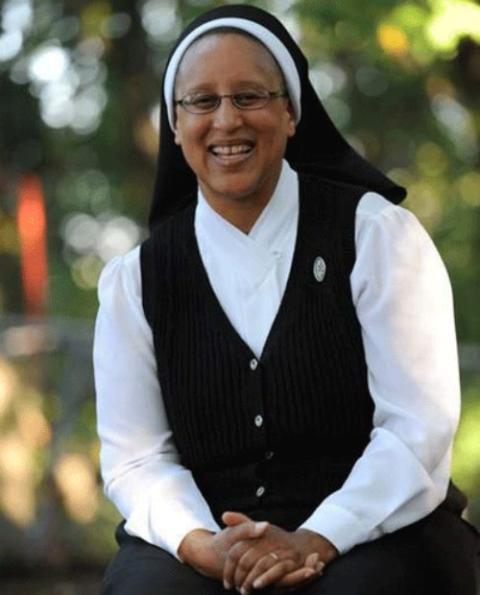
Sr. Marcia Hall of the Oblate Sisters of Providence (Courtesy of Destiny Productions)
Sr. Ilia Delio, a Franciscan Sister of Washington, D.C., and author of books regarding cosmology and Catholicism, said there's "a real naiveté" of each side thinking their candidate's win means all shall be well.
Even if things go smoothly with the election, Hall said, the United States is in the midst of both a global pandemic and deep-seated racial tensions.
"We won't all be holding hands and singing 'Kumbaya,' no matter who wins. ... It's going to take more than the election for us to start talking about coming together," she said.
Sr. Maribeth Larkin, the superior of the Sisters of Social Service, said U.S. politicians won't bridge political divides because that conflict is advantageous for them.
"We have been driven down a road of some of the worst examples of how to operate in public life that this country has ever seen," a process that began long before 2016, Larkin said.
Citizens can't find unity when their leaders are sowing division, she said.
"We have to grow up with that model and encouragement and have that model very visible in our public life."
Building bridges takes dialogue, listening
Sr. Barbara Nicholas, the president of the Loretto Community, wrote in an email to Global Sisters Report that in discussing the pre-election landscape with members of her community, a clear consensus emerged.
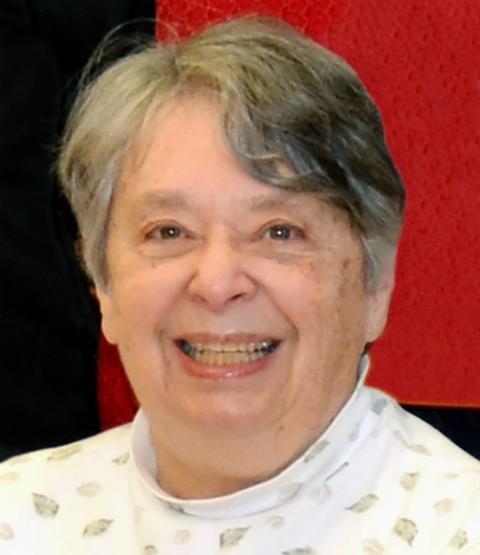
Sr. Barbara Nicholas of the Loretto Community (Courtesy of the Loretto Community)
"We know what everyone knows: in our country, half of us will be relieved and very optimistic with the outcome; half of us will stand in disbelief that so many could have chosen this candidate," she wrote.
"So, where we go as a country will depend on what motivates us to move forward. We want to have confidence that the newly elected leaders will see that every decision they make is made on behalf of the wellbeing of all us citizens. None of us wants to live during the next four years in fear, in dread that something awful will happen next to any of us."
The antidote to the division, Delio said, is the lesson found in humanity's roots with nature.
"Nature works symbiotically, cooperatively. It does new things. When the conditions are no longer optimal, it just finds ways to regroup, to work with new entities and to build new things," she said.
"We're self-annihilating because we don't trust," she said. "We don't just realize that the power of love still binds us together. ... Do we see it? Do we know it? Do we give thanks for the things that we have, the things we take for granted as we're trying to remake the world?"
Conversations around kitchen tables and friend circles need to change entirely if Americans are to mend relationships, said St. Joseph of Philadelphia Sr. Carol Zinn, executive director of the Leadership Conference of Women Religious, which represents 80% of U.S. sisters.

White militia members in Louisville, Kentucky, confront Black Lives Matter activists Sept. 5. (CNS/Reuters/Bryan Woolston)
Zinn said when she's struggling with the simultaneous emotions this era has stirred — "I don't know how I can weep with the heartache and weep out of absolute fury that we have arrived at this point," she said — she reminds herself that the present divisions are the product of the past 30 years of politics.
"When I try to think about talking to a friend or a family member, this space that has grown to a gap between us did not just tap in with this most recent campaign," she said. "It has been happening, and we have to learn again how to be in relationship with each other."
Those relationships require dialogue, not just talking past each other.
Larkin said those conversations begin by recognizing what British philosopher Mary Midgley wrote: "We can either live indulging our resentments or live knowing we are capable of embracing goodness, possibility and openness," Larkin said. "We are capable of recognizing each other as brother and sister. We're capable of that."
Advertisement
That requires setting your own perspective aside for a time.
"There has to be lot of room for empathy for the other's perspective, suspending judgment and trying to understand the other's perspective," Larkin said. "If we could have conversations that are not deeply embedded in our resentments, we could really listen and be open to understanding where the other is coming from. We're in this together. That's not going to disappear unless we get out our assault rifles."
The dialogue needs to happen across all facets of society, Hall said.
"One thing that has happened, there is more attention on our second pandemic, racism," she said. That attention "has to continue, particularly in the churches. Hopefully, people will get beyond the tentative questions and say, 'OK, we've made a step. What is the next step? How do we keep this going?' It will not be enough to talk to the Black people in your church for one session and then everything is fine."
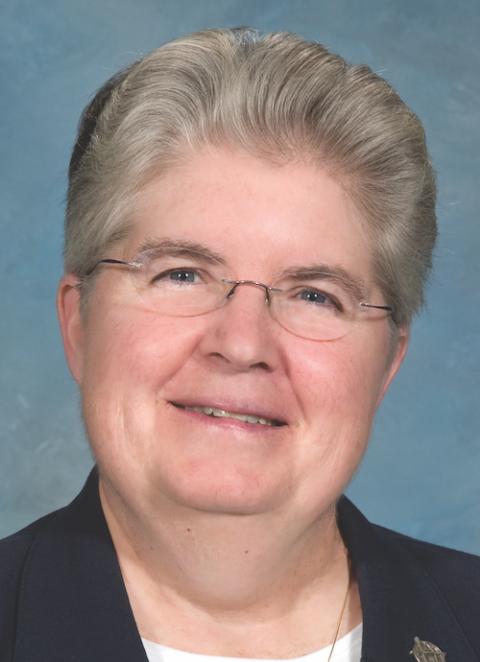
St. Joseph Sr. Carol Zinn, executive director of the Leadership Conference of Women Religious (Courtesy of LCWR)
Zinn said the way Americans currently talk to each other "is clearly not working, so we have to find another way." Otherwise, Americans' intolerance for one another will continue to fray their sense of community and shared humanity — or worse, lead to violence, she said.
One handy approach she said has helped her engage more meaningfully in what could have been tense conversations is displaying her own vulnerability and humility, responding to others with: "I've never thought about it that way. Could you say some more?"
"It's the interior work that we have to do," Zinn said. "I have to be ready for someone else to say something to me that catches my attention. It doesn't mean that I agree or that I'm going to change my thought, but I have to be open to being impacted. Otherwise, I'm not having a conversation."
'We've got to hear one another'
The Franciscan Sisters of Perpetual Adoration are in the midst of a three-week series of gatherings called "Listening & Loving Through the Political Storm," which features sessions such as "Loving Your Neighbor Who Votes Differently Than You" and "Untying Knots."
"With the listening series, we're not even touching on the issues," said Sr. Eileen McKenzie, the community's president. "It's just: How do we talk to each other as brothers and sisters?"
This is critical for society to continue to function, she said.
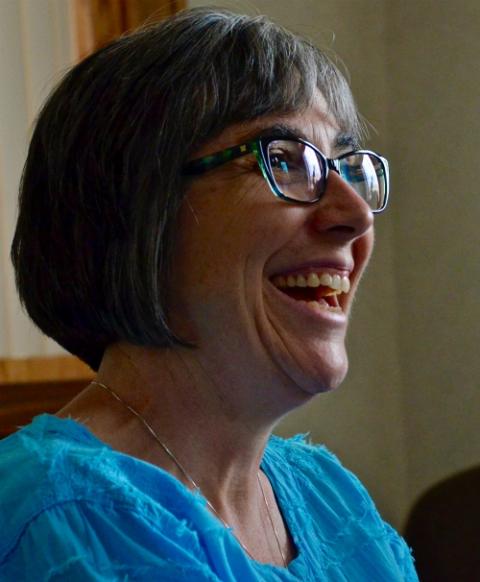
Sr. Eileen McKenzie of the Franciscan Sisters of Perpetual Adoration (GSR photo/Dan Stockman)
"That inability to communicate is not only becoming more divisive, it's becoming violent," McKenzie said. "So many people are pleading for some sense of dialogue, some sense of setting our own agenda aside and asking, what is the common good in all this?"
She noted that the Vatican's doctrinal assessment of LCWR ran into an impasse until both sides set aside their reactions and resentment and truly listened to each other. Because of that, they found a way forward, and the investigation ended two years early.
The Dominican Sisters of Hope have hosted weekly listening sessions since late March (unrelated to the election), and they will host a "contemplative space" via Zoom on election night, said Gina Ciliberto, the community's digital editor.
The session, from 6:30 p.m. to 10 p.m. Eastern, is open to the public, and individuals can attend for as little or as long as they'd like.
"Our hope is that this space will continue regularly beyond the election, as well," Ciliberto said.
Sr. Glenn Anne McPhee, a Dominican Sister of Mission San Jose, said with the pandemic and "glaring" social issues like racism and climate change, "people are raw."
She sees it in herself: She said she has strong political leanings and often feels the need to step back and calm down when in discussion with those who think differently. But she said she always comes back to try to "hear where they are."
"More than anything else, as religious women and as religious of any denomination throughout the world, we just need to step back from our own deeply held convictions and try to listen to where people are," McPhee said. "The mental health of our country, and probably of the whole world, is an issue. ... And we've got to hear one another to begin to heal."
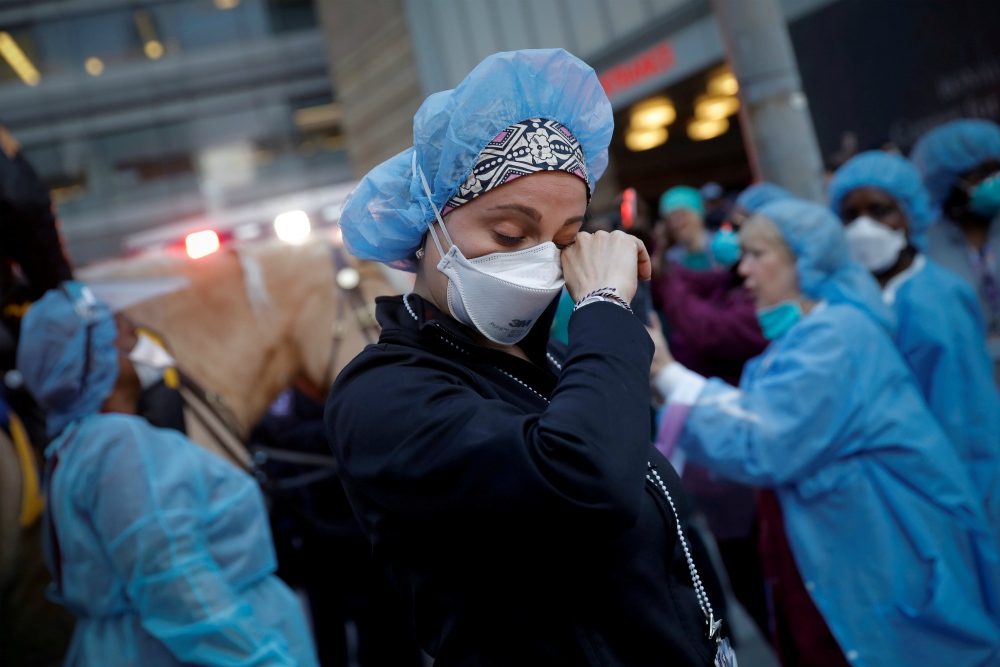
A nurse in New York City wipes away tears as police cheer and thank health care workers April 16 amid the coronavirus pandemic. (CNS/Reuters/Mike Segar)
Pray, breathe and search for God
Bridges will be necessary, Nicholas said, but "the bridges with one another that we as a country need to build begin with peace within ourselves. Building that inner peace is as difficult and as challenging as it is between countries; as it is between opposing political parties. Peace-building takes attention every day, and takes actions that flow from love of the neighbor as the self."
Delio also emphasized the need for self-love, as "to be at home with God is to be at home with oneself." She said the mass low-level depression plaguing Americans right now may be an invitation to slow down and appreciate the "virtue of enoughness," of friendship and belonging, of regaining a sense of pause and being, rather than frantically scanning the news.
"It's the bloom-where-you're-planted idea," Delio said. "We want big pictures solving the big-picture problems, but big-picture problems are rooted in tiny seeds of our lives. They begin in the small things we do, and then they tend to mushroom into big things."
Hall said she returns over and over to prayer.
"People sometimes feel prayer is a cop-out response — 'just pray' — but this is deep prayer," she said. "We're praying for this election in ways we probably have not ever done before because there's that underlying anxiety of what's going to happen."
She said the best things to do are get off social media, take mental health breaks and "remember to breathe. That sounds crazy, but you get so wound up, you forget to breathe."
McKenzie said it is in times of uncertainty, fear and darkness when God is moving in our lives.
"Cooperate with God in that. That's a grace. Let go of the fear, the control and the greed. Be in that place of holding loosely and trusting in God, and then being open to the way God can work in you," she said. "The times just look really dark right now, but God works profoundly in those times."
Nicholas wrote that she and other Loretto Sisters "stand with Mary at the foot of the Cross, bearing the pain of loss, of grief, of abandonment. We long for and reach for love, for peace to guide our actions for justice for all, not just a few; not just those who look like us, whose talk we recognize."
"I hope that we can live this way, lovingly working for justice, acting for peace on Election Day and the day(s) afterward when we know that we are likely to be annoyed or troubled some of the time," Nicholas wrote. "Let's imagine that our actions for justice are ripples of loving peace that flow out from each of us, unstoppable."
[Dan Stockman is national correspondent for Global Sisters Report. His email address is dstockman@ncronline.org. Soli Salgado is a staff writer for Global Sisters Report. Her email address is ssalgado@ncronline.org. Chris Herlinger is GSR New York and international correspondent. His email address is cherlinger@ncronline.org.]







